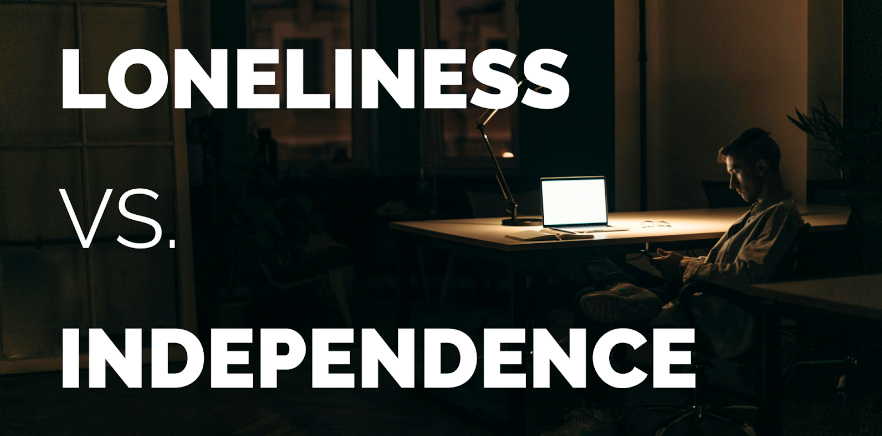Are We Confusing Loneliness For Independence?

Loneliness has been officially declared a global epidemic of major urgency by the World Health Organization (WHO). Many of us might be confusing it with independence without realizing how much it’s affecting our everyday lives.
KEY FACTS ABOUT LONELINESS:
Misinterpreting Loneliness as Independence
It can be easy to misinterpret the symptoms of loneliness and confuse them with being an independent individual. Independence does not exclude the craving for companionship. You can be an independent person and still yearn for human connection. Loneliness, on the other hand, involves more than just wanting to spend time with someone. It encompasses several distressing emotions and can have significant health consequences.
The Difference Between Loneliness and Independence
Independence itself can sometimes be lonely, but that doesn’t mean you are experiencing loneliness at its core. Loneliness comes with a combination of distressing emotions and consequences that directly impact your overall health. It’s essential to distinguish between the two to address the underlying issues effectively.
Global Efforts to Combat Loneliness
In response to this growing issue, the WHO launched the Commission on Social Connection in 2023. Led by the US surgeon general, Dr. Vivek Murthy, the commission aims to build a global agenda to address and mitigate the impacts of social isolation on mental and physical health. The proposal involves collaboration with high-level commissioners to develop social connection strategies, national policies, and psychological interventions to provide measurable solutions.
Are We Lonely or Independent? Strategies to Overcome Loneliness
As the WHO states, “social connection is a force for health, well-being, and economic good.” At The Skin Deep, we are dedicated to fostering deeper, healthy, and meaningful connections with those around us. Here are some strategies to help overcome loneliness:
1. Recognize the Signs
Understand the difference between being alone and feeling lonely. Recognizing the signs of loneliness can help you address the issue sooner. Some of the symptoms of loneliness can look like the following:
- Avoiding social interaction most of the time.
- Feeling distressed when alone.
- Increased buying sprees.
- Loss of interest in activities once enjoyed.
- Negative feelings of self-worth.
- Difficulty connecting with other people.
- Feeling extremely sad, lonely, tired or depressed.
- Spending large amounts of time alone.
*Note: Experiencing these symptoms does not necessarily mean you’re experiencing loneliness; these are just a few examples of potential indicators.
2. Reach Out to Others
Make an effort to connect with friends, family, or colleagues. Sometimes, a simple conversation can make a significant difference.
3. Engage in Community Activities
Participating in community events or volunteering can provide a sense of belonging and purpose, helping to alleviate feelings of loneliness.
4. Utilize Technology
While technology can sometimes contribute to feelings of isolation, it can also be a valuable tool for maintaining connections. Use social media, video calls, and messaging apps to stay in touch with loved ones.
5. Seek Professional Help
If feelings of loneliness persist, consider seeking help from a mental health professional. They can provide guidance and support to help you navigate through challenging times.
Fostering Connection Through Deep Conversations
Deep conversations can also be a powerful tool in combating loneliness and fostering meaningful connections. Here’s how engaging in more profound, heartfelt dialogues can help:
1. Building Trust and Understanding
Deep conversations allow individuals to share their thoughts, feelings, and experiences on a more intimate level. This sharing builds trust and understanding, creating a stronger bond between people. When we feel understood and accepted, it reduces feelings of isolation.
2. Enhancing Emotional Support
Engaging in meaningful conversations provides emotional support. Talking about our worries, fears, and dreams helps us feel less alone in our struggles. It also allows others to offer comfort, advice, or simply a listening ear, which can be incredibly reassuring.
3. Promoting Empathy and Compassion
When we engage in deep conversations, we practice empathy and compassion. Understanding another person’s perspective and emotions fosters a sense of connectedness and reduces the feeling of being misunderstood or alone.
4. Strengthening Relationships
Deep conversations can strengthen relationships by allowing individuals to connect on a deeper level. This stronger connection can lead to more fulfilling and supportive relationships, which are essential in combating loneliness.
5. Encouraging Self-Reflection and Growth
Deep conversations often involve reflecting on personal experiences and emotions. This self-reflection can lead to personal growth and a better understanding of oneself, which can improve one’s overall mental health and reduce feelings of loneliness.
6. Creating a Sense of Belonging
When people engage in deep, meaningful conversations, they often feel a sense of belonging. Knowing that someone cares about your thoughts and feelings and is willing to engage in meaningful dialogue can create a strong sense of community and connectedness.
Conclusion
Understanding the difference between loneliness and independence is crucial in addressing this global epidemic. By recognizing the signs, reaching out to others, and utilizing available resources, we can work towards overcoming loneliness and fostering meaningful connections.
How The Skin Deep Can Help
At The Skin Deep, we believe in the power of deep, meaningful conversations. Our projects, such as {THE AND} documentary series, {THE AND} Conversation Card Games, Honest X, Senior Orientation, The Window and The Dig, are designed to encourage and facilitate these connections. By providing tools and platforms for people to engage in heartfelt dialogues, we aim to help individuals build stronger, more meaningful relationships, thereby reducing loneliness and fostering a sense of community. Let us recognize and harness the incredible #PowerOfConnection by having meaningful conversations. Experience deeper connection with {THE AND} Relationship Card Games.
To learn more about the Commission on Social Connection visit https://www.who.int/groups/commission-on-social-connection




Leave a comment